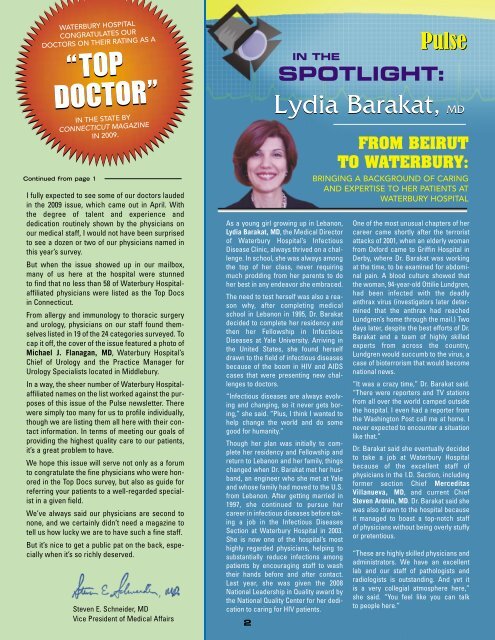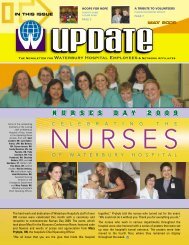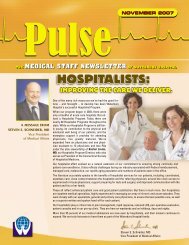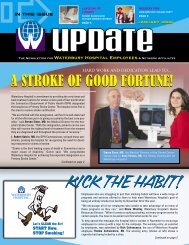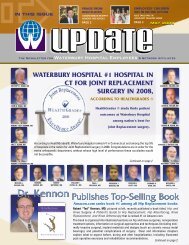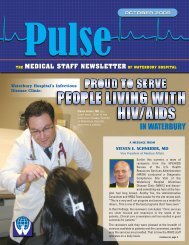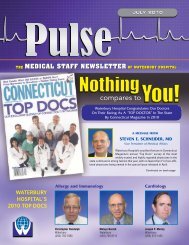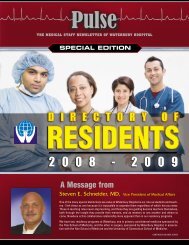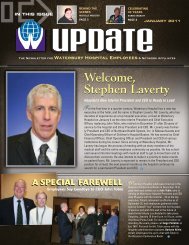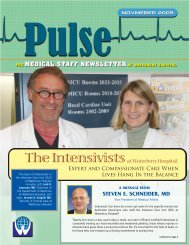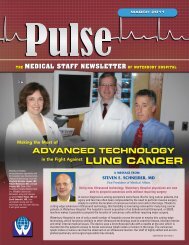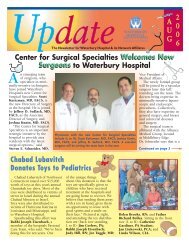June 2009 - Waterbury Hospital
June 2009 - Waterbury Hospital
June 2009 - Waterbury Hospital
You also want an ePaper? Increase the reach of your titles
YUMPU automatically turns print PDFs into web optimized ePapers that Google loves.
IN THE<br />
SPOTLIGHT:<br />
Lydia Barakat, MD<br />
Continued from page 1<br />
I fully expected to see some of our doctors lauded<br />
in the <strong>2009</strong> issue, which came out in April. With<br />
the degree of talent and experience and<br />
dedication routinely shown by the physicians on<br />
our medical staff, I would not have been surprised<br />
to see a dozen or two of our physicians named in<br />
this year’s survey.<br />
But when the issue showed up in our mailbox,<br />
many of us here at the hospital were stunned<br />
to find that no less than 58 of <strong>Waterbury</strong> <strong>Hospital</strong>affiliated<br />
physicians were listed as the Top Docs<br />
in Connecticut.<br />
From allergy and immunology to thoracic surgery<br />
and urology, physicians on our staff found themselves<br />
listed in 19 of the 24 categories surveyed. To<br />
cap it off, the cover of the issue featured a photo of<br />
Michael J. Flanagan, MD, <strong>Waterbury</strong> <strong>Hospital</strong>’s<br />
Chief of Urology and the Practice Manager for<br />
Urology Specialists located in Middlebury.<br />
In a way, the sheer number of <strong>Waterbury</strong> <strong>Hospital</strong>affiliated<br />
names on the list worked against the purposes<br />
of this issue of the Pulse newsletter. There<br />
were simply too many for us to profile individually,<br />
though we are listing them all here with their contact<br />
information. In terms of meeting our goals of<br />
providing the highest quality care to our patients,<br />
it’s a great problem to have.<br />
We hope this issue will serve not only as a forum<br />
to congratulate the fine physicians who were honored<br />
in the Top Docs survey, but also as guide for<br />
referring your patients to a well-regarded specialist<br />
in a given field.<br />
We’ve always said our physicians are second to<br />
none, and we certainly didn’t need a magazine to<br />
tell us how lucky we are to have such a fine staff.<br />
But it’s nice to get a public pat on the back, especially<br />
when it’s so richly deserved.<br />
Steven E. Schneider, MD<br />
Vice President of Medical Affairs<br />
As a young girl growing up in Lebanon,<br />
Lydia Barakat, MD, the Medical Director<br />
of <strong>Waterbury</strong> <strong>Hospital</strong>’s Infectious<br />
Disease Clinic, always thrived on a challenge.<br />
In school, she was always among<br />
the top of her class, never requiring<br />
much prodding from her parents to do<br />
her best in any endeavor she embraced.<br />
The need to test herself was also a reason<br />
why, after completing medical<br />
school in Lebanon in 1995, Dr. Barakat<br />
decided to complete her residency and<br />
then her Fellowship in Infectious<br />
Diseases at Yale University. Arriving in<br />
the United States, she found herself<br />
drawn to the field of infectious diseases<br />
because of the boom in HIV and AIDS<br />
cases that were presenting new challenges<br />
to doctors.<br />
“Infectious diseases are always evolving<br />
and changing, so it never gets boring,”<br />
she said. “Plus, I think I wanted to<br />
help change the world and do some<br />
good for humanity.”<br />
Though her plan was initially to complete<br />
her residency and Fellowship and<br />
return to Lebanon and her family, things<br />
changed when Dr. Barakat met her husband,<br />
an engineer who she met at Yale<br />
and whose family had moved to the U.S.<br />
from Lebanon. After getting married in<br />
1997, she continued to pursue her<br />
career in infectious diseases before taking<br />
a job in the Infectious Diseases<br />
Section at <strong>Waterbury</strong> <strong>Hospital</strong> in 2003.<br />
She is now one of the hospital’s most<br />
highly regarded physicians, helping to<br />
substantially reduce infections among<br />
patients by encouraging staff to wash<br />
their hands before and after contact.<br />
Last year, she was given the 2008<br />
National Leadership in Quality award by<br />
the National Quality Center for her dedication<br />
to caring for HIV patients.<br />
2<br />
FROM BEIRUT<br />
TO WATERBURY:<br />
BRINGING A BACKGROUND OF CARING<br />
AND EXPERTISE TO HER PATIENTS AT<br />
WATERBURY HOSPITAL<br />
One of the most unusual chapters of her<br />
career came shortly after the terrorist<br />
attacks of 2001, when an elderly woman<br />
from Oxford came to Griffin <strong>Hospital</strong> in<br />
Derby, where Dr. Barakat was working<br />
at the time, to be examined for abdominal<br />
pain. A blood culture showed that<br />
the woman, 94-year-old Ottilie Lundgren,<br />
had been infected with the deadly<br />
anthrax virus (investigators later determined<br />
that the anthrax had reached<br />
Lundgren’s home through the mail.) Two<br />
days later, despite the best efforts of Dr.<br />
Barakat and a team of highly skilled<br />
experts from across the country,<br />
Lundgren would succumb to the virus, a<br />
case of bioterrorism that would become<br />
national news.<br />
“It was a crazy time,” Dr. Barakat said.<br />
“There were reporters and TV stations<br />
from all over the world camped outside<br />
the hospital. I even had a reporter from<br />
the Washington Post call me at home. I<br />
never expected to encounter a situation<br />
like that.”<br />
Dr. Barakat said she eventually decided<br />
to take a job at <strong>Waterbury</strong> <strong>Hospital</strong><br />
because of the excellent staff of<br />
physicians in the I.D. Section, including<br />
former section Chief Merceditas<br />
Villanueva, MD, and current Chief<br />
Steven Aronin, MD. Dr. Barakat said she<br />
was also drawn to the hospital because<br />
it managed to boast a top-notch staff<br />
of physicians without being overly stuffy<br />
or pretentious.<br />
“These are highly skilled physicians and<br />
administrators. We have an excellent<br />
lab and our staff of pathologists and<br />
radiologists is outstanding. And yet it<br />
is a very collegial atmosphere here,”<br />
she said. “You feel like you can talk<br />
to people here.”


